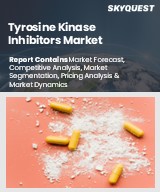
Report ID: SQMIG35A3039
Skyquest Technology's expert advisors have carried out comprehensive global market analysis on the tyrosine kinase inhibitors market, covering regional industry trends and market insights. Our team of analysts have conducted in-depth primary and secondary research to provide regional industry analysis and forecast of tyrosine kinase inhibitors market across North America, South America, Europe, Asia, the Middle East, and Africa.
As per regional forecast, North America holds a significant position in the global tyrosine kinase inhibitors market, driven primarily by advanced healthcare infrastructure, high prevalence of cancer, and substantial investments in research and development. The region benefits from strong regulatory support and widespread adoption of innovative targeted therapies, making it a key market globally.
As per industry analysis, the United States dominates the North America region due to its robust pharmaceutical industry, high incidence of cancer cases, and access to cutting-edge technology and clinical trials. Strong government initiatives supporting cancer research and personalized medicine further accelerate market growth in the US.
Canada’s market growth is propelled by increasing awareness about cancer treatment options, expanding healthcare coverage, and rising adoption of advanced therapies. The country’s focus on improving patient outcomes through precision medicine supports demand for tyrosine kinase inhibitors.
As per regional outlook, Asia Pacific is witnessing rapid growth in the tyrosine kinase inhibitors market, fueled by rising cancer prevalence, improving healthcare infrastructure, and increasing government initiatives to promote cancer care. The region’s growing middle-class population and expanding healthcare expenditure also contribute to market expansion.
Japan is a key market within Asia Pacific due to its advanced medical research capabilities, aging population with a high cancer burden, and early adoption of targeted therapies. Strong pharmaceutical innovation and reimbursement frameworks support steady market growth in Japan.
South Korea’s tyrosine kinase inhibitors market benefits from increasing government support for cancer research, rising awareness of targeted therapies, and improved healthcare access. The country is rapidly adopting innovative cancer treatments, which drives growth in this segment.
Europe holds a prominent tyrosine kinase inhibitors market share, supported by high healthcare standards, extensive cancer treatment programs, and strong regulatory frameworks promoting innovative therapies. The region's emphasis on research and collaborations further fuels market growth.
Germany is a leading market in Europe due to its well-established healthcare system, high cancer prevalence, and extensive investment in pharmaceutical research. The country’s commitment to personalized medicine and early access to advanced treatments supports tyrosine kinase inhibitors market growth.
The UK region in the market benefits from a strong oncology research base, increasing government funding for cancer care, and active participation in global clinical trials. Public and private healthcare sectors are investing in targeted therapies, driving demand for tyrosine kinase inhibitors.
Italy’s market growth is supported by rising cancer incidence, improvements in healthcare infrastructure, and growing awareness about innovative cancer treatments. The country is gradually adopting precision medicine approaches, increasing the uptake of tyrosine kinase inhibitors.
REQUEST FOR SAMPLE
Global Tyrosine Kinase Inhibitors Market size was valued at USD 35.37 Billion in 2023 and is poised to grow from USD 37.08 Billion in 2024 to USD 54.04 Billion by 2032, growing at a CAGR of 4.82% in the forecast period (2025-2032).
The competitive landscape of the global tyrosine kinase inhibitors industry in 2024 remains dynamic and innovation-driven, characterized by intense rivalry among major pharmaceutical players and emerging biotechs. Leading companies such as Pfizer, Novartis, and AstraZeneca continue to invest heavily in research and development to bring next-generation TKIs with improved efficacy and safety profiles to market. 'GlaxoSmithKline plc (GSK)', 'Galapagos NV', 'Nimbus Therapeutics', 'Pfizer Inc.', 'Novartis AG', 'Bristol-Myers Squibb Company', 'AstraZeneca plc', 'Roche Holding AG', 'Merck & Co., Inc.', 'Eli Lilly and Company', 'Bayer AG', 'AbbVie Inc.', 'Daiichi Sankyo Company, Limited', 'Takeda Pharmaceutical Company Limited'
The global rise in cancer cases, particularly types such as lung cancer, breast cancer, and leukemia, is a major driver for the Tyrosine Kinase Inhibitors market. TKIs offer targeted treatment by interfering with specific enzymes responsible for cancer cell growth, making them highly effective and preferred options over traditional chemotherapy. This growing demand for precision medicine, coupled with increased awareness and early diagnosis, is significantly expanding the patient pool that can benefit from TKIs.
Combination Therapies with Immunotherapy: One of the most promising industry trends is the use of TKIs alongside immunotherapies like checkpoint inhibitors. This combination approach aims to boost the immune system’s ability to recognize and attack cancer cells while simultaneously blocking kinase-driven tumor growth. Early clinical trials have shown improved response rates and longer progression-free survival with these regimens. Such combination therapies are becoming a focal point of research and are expected to reshape standard treatment protocols in oncology, providing new growth opportunities for the market.
How is North America Leading Through Innovation and Advanced Cancer Therapies?
Want to customize this report? This report can be personalized according to your needs. Our analysts and industry experts will work directly with you to understand your requirements and provide you with customized data in a short amount of time. We offer $1000 worth of FREE customization at the time of purchase.
Feedback From Our Clients

Report ID: SQMIG35A3039
sales@skyquestt.com
USA +1 351-333-4748